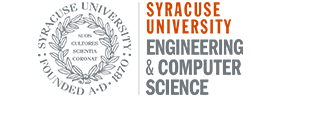 |
| |
| Awarded Proposals - Jeongmin Ahn, Assoc. Professor in Mechanical and Aerospace Engineering, won an award from the American Society of Mechanical Engineers to fund a student scholarship.
- Howard Blair, Professor in Electrical Engineering and Computer Science, won an award titled Blockchain Study: Quantum Immunity and Keyless Signatures through his industrial collaboration with Lockheed Martin. The award is funded by US Air Force Research Labs/Rome.
- Dr. Jun Choi, Asst. Professor in Electrical Engineering and Computer Science, won an award titled Adaptable Compressed Jaumann Absorber for Harsh and Dynamic Electromagnetic Environments from the Air Force Office of Scientific Research.
- John Dannenhoffer, Professor in Mechanical and Aerospace Engineering, won an award titled Design Responding to Engineering Analysis in Support of Manufacturing (DREAM) through his collaboration with researchers at the University of Utah. The award is funded by DARPA.
- Dr. Vir Phoha, Professor in Electrical Engineering and Computer Science, won an award titled Enhanced Attribution through his industrial collaborations. The award is funded by DARPA.
- Qinru Qiu, Professor in Electrical Engineering and Computer Science, won a Syracuse University Planning Grant: I/UCRC for Alternative Sustainable and Intelligent Computing funded by NSF.
|
| |
| |
|
| Funding Opportunities NCATS Pilot Program for Collaborative Drug Discovery Research using Bioprinted Skin Tissue (NIH, U18) - Feb 28 (LOI), Apr 15 (Full Proposal); the goal of this FOA is to enable the development of 3D-bioprinted tissue models for drug discovery, including efficacy studies and toxicology research through a collaborative arrangement between the 3-D Bio printing program at the NCATS and extramural scientists.
Innovative Molecular and Cellular Analysis Technologies for Basic and Clinical Cancer Research (NIH, R21) - Sep 26 (NIH); solicits grant applications proposing exploratory research projects focused on the early-stage development of highly innovative technologies offering novel molecular or cellular analysis capabilities for basic or clinical cancer research.
Catalysis (NSF) - Oct 10; the goal of the Catalysis program is to advance research and promote fundamental understanding and the development of catalytic materials and reactions that are of benefit to society. Target applications include fuels, specialty and bulk chemicals, environmental catalysis, biomass conversion to fuels and chemicals, conversion of greenhouse gases, and generation of solar hydrogen, as well as efficient routes to energy utilization.
Cisco Research - Cisco Research has released several new RFPs and seeks proposals from leading academic research groups. Research interests include (1) networking technologies, (2) hardware, (3) security, and (4) disruptive ideas such as Named Data Networking, When will IP run out of steam, and what will replace it?, Internet economic models & policy impact
Plant Genome Research Program (PGRP) (NSF) - No deadline; seeks research to address fundamental biological questions in plants of economic importance on a genome-wide scale, to overcome constraints in plant transformation through breakthrough discoveries and data mining challenge to reuse and unleash new information from available large-scale datasets.
Condensed Matter and Materials Theory National Science Foundation (NSF) - No deadline; supports theoretical and computational materials research in Condensed Matter Physics (CMP), Biomaterials (BMAT), Ceramics (CER), Electronic and Photonic Materials (EPM), Metals and Metallic Nanostructures (MMN), Polymers (POL), and Solid State and Materials Chemistry (SSMC).
Ceramics (NSF) - No deadline; supports fundamental scientific research in ceramics (e.g., oxides, carbides, nitrides and borides), glass-ceramics, inorganic glasses, ceramic-based composites and inorganic carbon-based materials.
|
| |
| |
|

